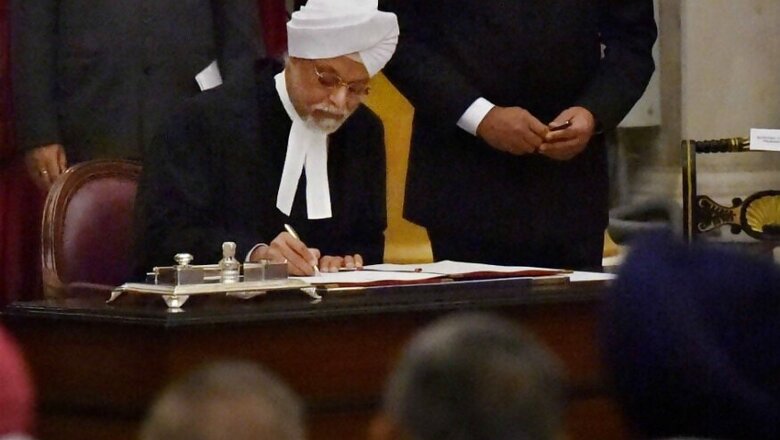
views
New Delhi: The Supreme Court is all set to rule on Thursday whether the Right to Privacy is a fundamental right in India. A nine-judge Constitution Bench headed by Chief Justice of India JS Khehar will define the contours of privacy in India and the judgment is likely to have wide-ranging implications in our lives. Here is all you need to know about the case:
What is the Supreme Court judgment all about?
Is the Right to Privacy a fundamental right that should get Constitutional protection? Privacy has been recognized as a right but elevating it to the status of a fundamental right would mean making it a right cherished under the Indian Constitution, which cannot be taken away even by making a law. If privacy becomes a fundamental right, state actions can be challenged before constitutional courts as a matter of absolute right.
Why is the court adjudicating it now?
It was during the debate on Aadhaar when a clutch of petitioners arguing against this scheme contended that collection of biometric data and their sharing are in contravention of their Right to Privacy. While they said privacy is a natural fundamental right, the Central government called it an elitist concept.
What has been the central government’s stand?
The government has argued something as amorphous as privacy cannot become a fundamental right. Another argument is that when the country has millions of people below the poverty line seeking food and shelter, privacy cannot be exulted as a fundamental right as it would scuttle social welfare schemes, in particular those that are regulated through Aadhaar now.
Why do we have a Constitution Bench with as many as nine-judges hearing this case?
A six-judge bench in 1954 and then an eight-judge bench in 1962 held that privacy is not a fundamental right but it is a common law right, whose violation can be compensated by damages. So when the petitioners in Aadhaar case asserted privacy as a fundamental right, the government said only a nine-judge bench could reconsider and assess the wisdom of what has already been ruled by the eight-judge bench.
What is the Supreme Court judgment on #RightToPrivacy case is all about? CNN-News18's @utkarsh_aanand is here to explain you. pic.twitter.com/6oz2xkrUV4— News18 (@CNNnews18) August 24, 2017
How does this judgment impact the life of everyone in this country?
Aadhaar is the bedrock of all social welfare measures and other schemes, even including filing of income tax returns. Sharing or leakage of Aadhaar date is a dangerous proposition as biometrics like iris and fingerprints of individuals can be misused in crimes and other uncivil acts. Apart from this, sharing of messages, photos, etc, shared between two persons using mobile phones is also an aspect of privacy and a service provider cannot legitimately get access to them and use them for other purposes.
Is the future of Aadhaar dependent on this judgment?
If the nine-judge bench on Thursday rules that privacy is a fundamental right, the Aadhaar case goes back to a five-judge bench. The five-judge bench will then examine whether the scheme of collection and storage of data under the Aadhaar is an aspect of individuals’ right to privacy and if so, does Aadhaar breaches privacy.
What are the other issues that can be impacted if privacy becomes a fundamental right?
Besides Aadhaar, criminalisation of homosexuality under Section 377 of the IPC can be one of the things that could get affected by the SC verdict. Homosexual relationship between consenting adults is indeed a matter of privacy and if it becomes a fundamental right, validity of the penal provision will come under scrutiny for trampling upon this right. Also, the indifferent sharing of personal information by financial institutions and telemarketeers may also not pass the muster if privacy is assigned the status of a fundamental right.


















Comments
0 comment